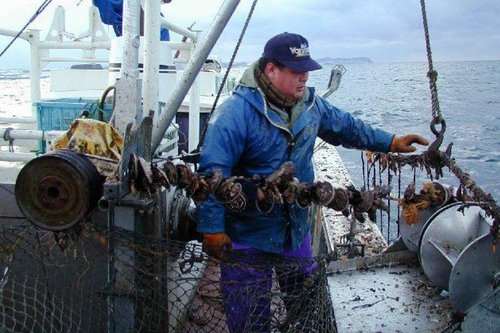October 18, 2013
Japan's Scallop Fishery in Hokkaido Awarded MSC Certification for Sustainability
Keywords: Ecosystems / Biodiversity Food

Copyright MSC All Rights Reserved.
The scallop fishery overseen by the Hokkaido Federation of Fisheries Cooperative Association in Japan gained certification for meeting the global standard for sustainable and well-managed fisheries set by the Marine Stewardship Council (MSC), a London-based non-profit organization, on May 13, 2013.
The total catch in the fishing area covered by the certification in 2012 reached 410,000 metric tons, making it the world's largest scallop harvest. The scallops are shipped not only to Japanese markets but also to Southeast Asia, Europe, and the United States. With the certification, Hokkaido's scallops are now eligible to bear the blue MSC eco-label, which assures consumers that they are traceable to a sustainable fishery.
The Hokkaido scallop fishery was first started in the 1800s in the Okhotsk Sea, and expanded further in the early 1900s through the introduction of fishing machines, until its annual catch reached 80,000 metric tons. Catches then plummeted to 6,000 metric tons by 1955 due to indiscriminate fishing, but the fishery recovered to annual landings of 70,000 metric tons by 1975 with the introduction of new seed-production equipment and a modified cultivation process.
Today Hokkaido's annual scallop harvest remains stable at 400,000 metric tons. The MSC certification rewards the Hokkaido Federation of Fisheries Cooperative Association's scallop fishery for its leadership and commitment to sustainable fishing practices, and the association intends to work on developing the fishery even further through continual improvement.
Related JFS Articles
Related
"JFS Newsletter"
- Fifth Contest to Award Excellent Environmental and Social Practices by Junior High, High School Students
- Coco Farm & Winery: An Amazing Model of Special Needs Students and Community
- Locally Produced Food in School Lunches----A Challenge by Nyuzen, Japan
- Seikatsu Club: Japanese Cooperative Managed by Members' Will to Confront Social Problems
- Increase Revenues without Increasing Catches -- How the Sustainable Sakura Shrimp Fishery in Suruga Bay Does It
Related
"Popular Articles"
- Yukiguni Maitake and Grameen Group Launching Joint Mung Bean Project in Bangladesh
- Japan's Food Self-Sufficiency Ratio Unchanged at 40% for 8 Years
- Food Pictograms Used at APEC SME Summit 2010
- Rental Organic Farm Provides Farmland for Housing Development Project
- Greenpeace Survey Ranks Five Top Japanese Supermarket Chains for Fish Safety, Finds Problems


